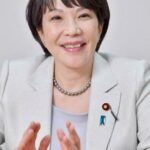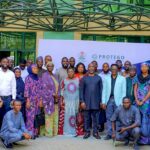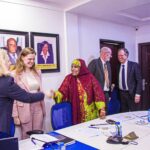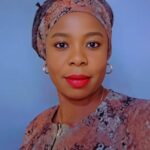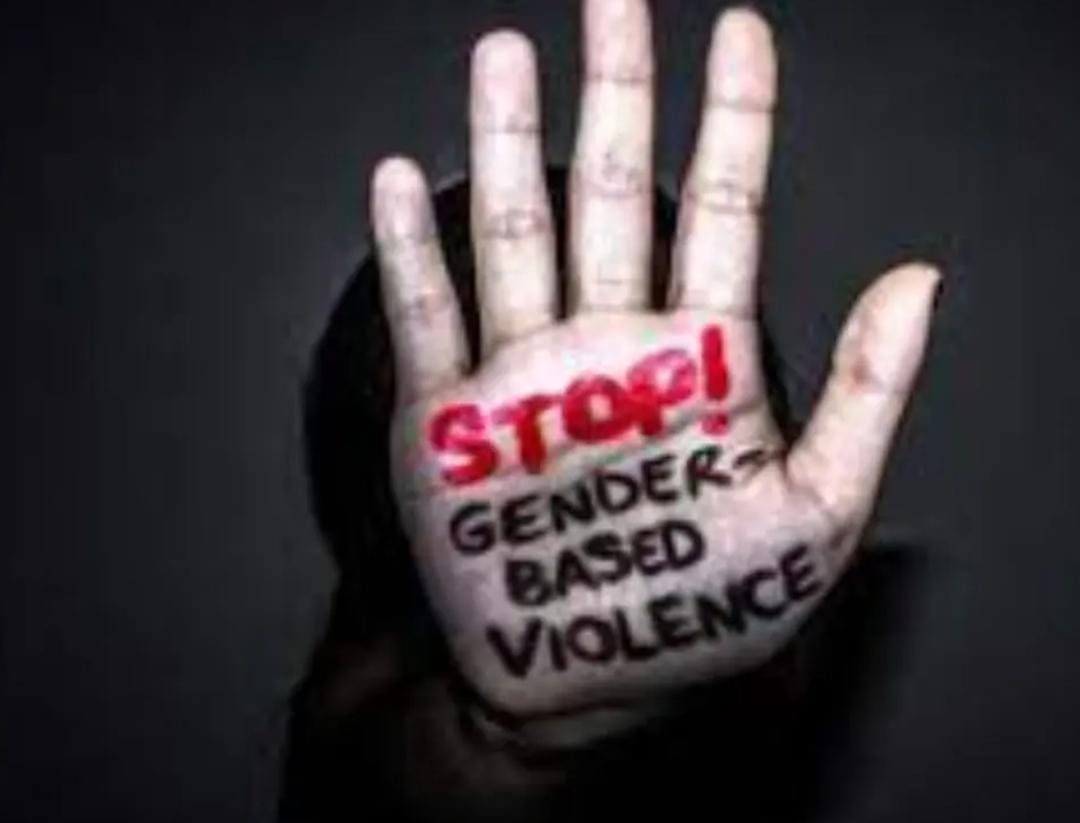By Oluwafunke Ishola, News Agency of Nigeria (NAN)
The silence that surrounds Adamo village, Ikorodu, was disrupted by uproar from the street, making residents rush outside to behold Bolanle beating her husband.
The couple’s quarrel isn’t strange to residents of the community, but witnessing Bolanle plummet her husband inside the gutter with a series of blows is a shocking sight.
Bolanle, though a beautiful lady, is quarrelsome and feared by both the young and old in Adamo. It’s not unusual to hear people say, “Avoid her, if she could treat her husband in such a cruel way, what won’t she do to you.”
Her husband, Kazeem, who also suffers verbal and emotional abuse from her, is termed a “weak” man, ridiculed and shunned by other men who see his behaviour as an “aberration” from African manliness.
In a largely patriarchal society like Nigeria where the male folk are expected to be more dominant due to their physical strength, it can be considered shameful to hear that a man was threatened or beaten by his partner.
Kazeem masks and drowns his pain with bottles of alcohol, as the society terms it “unmanly” to cry out for help.
For many men in similar situations as Kazeem, who suffer physical, verbal, psychological and sexual violence, an indelible scar, both seen and unseen, is left on these survivors.
The trauma often manifests in anxiety, depression, and difficulty forming healthy relationships later in life.
Violence against men is a problem in Nigeria and globally, but it is often underreported and marginalised: stigma, shame, and a culture of silence make it difficult to report GBV against men.
Highlighting the issue, Dr Habu Dahiru, Gombe State Commissioner for Health, noted that gender-based violence affects both genders, though women remain disproportionately impacted.
Dahiru disclosed that the state recorded 388 female and 144 male gender-based violence cases from 2021 to 2024.
“While GBV is more prevalent among women, men are not spared. The data underscores the significance of this issue,” Dahiru said.
Similarly, data from the Lagos State Domestic and Sexual Violence Agency revealed that the state recorded 24,009 SGBV cases, between January 2019 and December 2023.
The data showed that Lagos recorded 6,389 reported cases of SGBV against adults and children in 2023.
According to the data, 90 per cent of adult cases are female, while 10 per cent are male.
With a significant portion of men facing GBV, the question begs why adequate attention isn’t given to this particular gender.
Commenting, Vincent Dania, Programme Coordinator, African Centre for Leadership, Strategy and Development (Centre LSD), noted that GBV against men, which was previously uncommon in society, was now on the rise.
Dania explained that the Violence Against Persons Prohibition (VAPP) Act is gender-neutral and aimed at eliminating violence against persons irrespective of gender.
VAPP Act 2015 is a Nigerian law that criminalises various forms of violence, including physical, sexual, and emotional abuse.
According to Dania, every individual deserves respect, dignity and safety, stressing the importance of zero tolerance for gender-based violence.
“Lately, we have discovered a lot of violence against men and we must insist that as much as women and children are at the centre of our work, we don’t condone any form of violence against anyone, especially men,” Dania said.
Centre LSD is part of the implementing partners in the EU-UN funded Spotlight Initiative.
The Spotlight Initiative works with governments and civil society organisations to prevent domestic and family violence by raising awareness, establishing and implementing laws and policies and improving quality essential services for survivors.
Similarly, Mr Saheed Agboola, a traditional leader, emphasised that GBV remained the most widespread human rights violations impacting socio-economic development and conflicting the values of human dignity and sanctity in communities.
Agboola works closely with other traditional and religious leaders, local authorities, police, and community activists to address gender violence.
“The goal is clear, we intend to stop violence in our community. Any person who violates the law will be held responsible,” Agboola said.
As the global community celebrates 16 Days Activism Against Gender-Based Violence, it is a key international moment to call for an end to violence against women and girls (VAWG).
The Activism runs from Nov. 25 (the International Day for the Elimination of Violence Against Women) until Dec. 10, Human Rights Day.
The World Health Organisation (WHO) said around the world today, prolonged and intense conflicts have resulted in a continuous rise in all forms of gender-based violence.
Speaking, Mr Adrian Moyo, Ward 2 Councillor, Bulawayo City Council, Zimbabwe, noted that the 16 days Activism against gender-based violence were critical to shattering stigma, validating experiences and prioritising mental health for male victims of GBV.
According to Moyo, this is vital for a compassionate and inclusive society.
“Men can be victims. Your experience is valid, your mental health matters.
“Let’s shatter the stigma surrounding male victims of gender-based violence. Break the silence, seek support and heal,” Moyo said.
Similarly, Ms. Mediatrice Barengayabo, Head of International Organisation for Migration (IOM), Benue Sub-Office, said collective action was required to address gender-based violence.
“It takes a community united in purpose and action to eradicate gender-based violence. Through education, we can create safer communities and a brighter future for all,” Barengayabo said.
Commenting, Mr Edem Akpan, a Human Rights Lawyer, said male victims of GBV were not given adequate support, noting that the society was quick to condemn and publicly denounce male perpetrators of GBV but did not accord the same treatment to females who victimised and abused men and boys.
According to him, false rape accusations, poisoning and physical assault are on the rise against men.
He stressed that these vices have exposed innocent men to online bullying, stigmatisation, loss of economic opportunities, psychological trauma, and even suicide.
“Our silence in the face of gender-based violence is not an option. Silence means we condone violence and this isolates survivors, leaving them feeling unsupported and powerless.
“By speaking out, we create a culture of accountability and solidarity, encouraging survivors to come forward and seek justice,” he said.
Akpan emphasised that collective actions would encourage open, and honest dialogue, influence policy changes, drive societal awareness, and foster an environment where every individual is valued and protected.
He recommended that the GBV regulatory framework should be reviewed to render them gender-balanced.
Corroborating Akpan, a report titled: “Hidden Suffering: Gender Based Violence (GBV) Against Boys and Men” published in the South-African College of Applied Psychology (SACAP), acknowledged that the current GBV framework was largely one of violence perpetuated against girls and women.
“This is understandable given the scope of the crisis and worldwide perpetuation of gender inequalities, which overall result in women being more vulnerable than men.
“However, the challenge with this dynamic is that it largely mitigates the reality and extent of GBV against boys and men,” the report said.
It submits that GBV against both women and men is a human rights violation and constitutes a crime.
The report notes that the full scale of GBV, specifically sexual (SGBV) against boys and men is unknown.
“It is a hidden issue which many organisations are reluctant to engage with.
“Complicating the situation is the opposition to the promotion of awareness of GBV against men due to the misunderstanding that highlighting the issue will promote a misogynist agenda and detract from the severity of the crisis of GBV against girls and women.
“This has resulted in a lack of research and little empirical evidence to carry forward policies, advocacy and strategies to assist prevent and intervene in GBV against boys and men.”
It emphasised that acknowledgement of GBV against boys and men is not in opposition, nor detracts from the seriousness and magnitude of GBV against girls and women.
“Acknowledging GBV against men assists with combating GBV against women,” it said.
It stressed that supporting all survivors and helping them report GBV assists in breaking the legacy and cycle of GBV for generations to come.
Stakeholders submit that accelerating progress requires concerted efforts from governments, international organisations, civil societies and individuals to create a more equitable and gender-balanced world where every individual has equal opportunities to thrive and live a healthier life.
They emphasise that GBV is not just a woman’s issue— but a human issue, calling for collective actions to fight gender-based violence. (NANFeatures)
**If used, please credit the writer and the News Agency of Nigeria (NAN)





